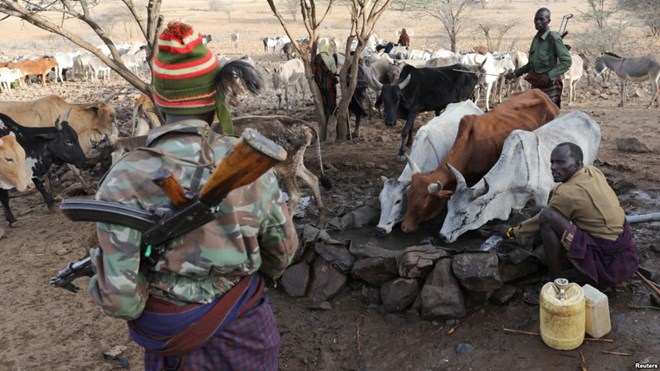
Thursday February 16, 2017

Boasting spectacular wildlife and majestic scenery, central Kenya’s Laikipia area has long been on the country’s tourist circuit, sitting against the backdrop of Mount Kenya.
But due to drought, northern pastoralists are illegally bringing tens of thousands of cattle to private and community lands in search of water and grazing lands, often bringing them into conflict with landowners, and displacing wildlife.
Several people have been killed in these conflicts, with others injured. Attacks on three out of approximately 50 ranches, farms, and conservancies have been reported, including a tourist lodge that was burned down at the end of January.
But Laikipia Farmers’ Association chairman Martin Evans says all land owners have been affected in some way.
“Every single owner’s had damage,” said Evans. “When they come in, they smash your fences, they smash all your infrastructure, all your buildings, your security houses, your solar panels, electric energizers, they steal and smash. I haven’t heard of one who hasn’t been.”
Drought impact
Kenya’s spokesperson for the Ministry of Interior Mwenda Njoka blames it on one factor.
“Drought, drought, drought,” said Njoka. “The dry stint that has been in that area for a long time and in many other parts of the country. That is what has caused these people to move their cattle to areas where there is grass and water.”
But that is not an excuse, says Paula Kahumbu, CEO of WildlifeDirect.
“This drought was known about more than six months ago. These incidents started more than six months ago. There was ample opportunity for the state and state organs to respond and they didn’t,” said Kahumbu. “These cattle should have been bought up and the people had their money put away somewhere safe well before the drought reached this point.”
And, it’s not just a drought that is based on climatic conditions, argues Frank Pope, CEO of Save the Elephants.
“This is a drought based on chronic overgrazing of this ecosystem,” said Pope. “We’ve got several different data streams showing us the dramatic degradation that northern Kenya has suffered, and I think the same holds true for many other areas in Kenya where we’ve had too many livestock on the ground, exerting huge grazing pressure on the ground. About three-quarters of the northern rangelands is now at or below the level of organic soil carbon required for plant growth.”
Complex issue
It is is a complex socio-economic issue, according to Njoka, who says the government is working to get the situation under control.
“We’ve been doing a lot,” said Njoka. “And we’ve sent security forces, police officers who are deployed to the area, from different units, to go and protect these farms and ensure they are not invaded. Although sometimes it has not been as successful as we’d have wanted, but there’s a lot the government has been doing on that.”
Kahumbu says the pastoralists are highly adapted to extremely dry conditions, which demonstrates the severity of their current situation.
“So for them to have resorted to raiding private land and community land, is really a reflection of how serious the drought is,” said Kahumbu. “It’s a famine for them, so let’s not forget that these are people who are in dire straights and the government of Kenya has failed them too, which is why they’re doing what they’re doing.”
But Kahumbu and other conservationists cannot fully explain why wildlife have been killed. The Kenya Wildlife Service has recorded at least nine elephant deaths, as well as those of other endangered species like giraffes and the Grevy’s zebra.
“The wildlife is the lowest on the chain when it comes to competing with livestock, because the livestock are accompanied by humans, and these humans have arms, often,” said Pope.
Because few wildlife trophies have been taken, some conservationists believe retribution may be more at play than poaching.
Kenya is to hold national elections in August. Evans, Kahumbu and Pope argue politicians directly or indirectly condone their constituents encroaching onto private land, to win their support. But Njoka responds the elections have nothing to do with the situation.
The Laikipia Farmers’ Association wants the government to begin a disarmament program, prosecute the people involved, and enforce the law. Some conservation groups suggest the government buy some livestock to assist the pastoralists, as well as to bring harvested grass from other parts of the country to Laikipia to help feed the animals.
But everyone agrees a long-term solution must be found.